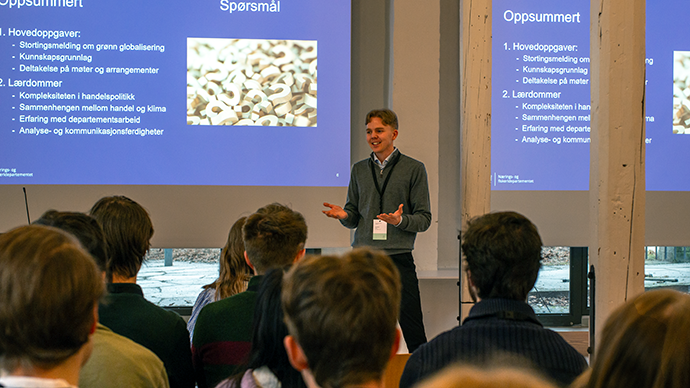This article is translated by UiOGPT Version 4
At diverse workplaces such as Statistics Norway, the Norwegian Confederation of Trade Unions, Norad, and PwC, master's students from the Department of Economics (ØI) have recently completed eight weeks of practical training. On March 13th, the aspiring economists presented their field experiences.
One of them was Jon Henrik Sverdrup Lund, who had an internship at the Ministry of Trade, Industry and Fisheries. In his practical work, the master's student was able to utilize what he refers to as the reflexes ingrained from his economics studies.
"You gain a certain foundation when you have seen the equilibrium diagram countless times, and have rehearsed things like consumer surplus and producer surplus, microeconomics, and all the other basic concepts from the economics education," says Sverdrup Lund.
"Eventually, you develop an economics instinct that allows you to immediately react to whether a statement is correct, or not."
What the working world requires
Sverdrup Lund is in his second semester of the master's program in economics. After choosing the course "Internship in Economics," he secured a placement at the Ministry of Trade, Industry and Fisheries, where he has been involved in shaping a major parliamentary report on the connection between international trade and climate.
"The most exciting part has been seeing how a department works, and learning about how the Ministry of Trade, Industry and Fisheries collaborates with other ministries and sectors to drive processes and ensure political support," he says.
During the internship, Sverdrup Lund has confirmed an already passionate interest in public administration and international relations.
"I have learned a bit more about what is required in the working world, what kind of professional experience and competence actually counts," he says.
"Going back to my studies, I will take with me a focus on the connection between international trade and climate, to find out if there is any research missing in the field that I can possibly delve into with my master's thesis." .

Very different work tasks
Karen Helene Ulltveit-Moe, a professor and head of the Department of Economics (ØI), was one of the initiators when the internship course was held for the first time in 2023. She believes that an internship should be of interest to most students because it is so important to establish close links between academia and the working world.
"We know that practical experience is sought after when students have completed their degrees and are entering the job market," she says.
Ulltveit-Moe enjoys hearing about everything the students have been involved in and how they have been able to apply their economic skills in various ways.
"Some have had the opportunity to work on a wide range of different tasks, while others have worked more consistently on specific projects," she says.
Ulltveit-Moe is also grateful to the businesses that have accepted and arranged for internships.
"They use quite a lot of resources to accommodate our students. The fact that several have chosen to participate again as we organize this for the second time, I interpret as a sign that the businesses get something out of the collaboration, and that they think our students are competent," she says.
"Then we must ensure that they remain attractive, even after they have completed their studies."
